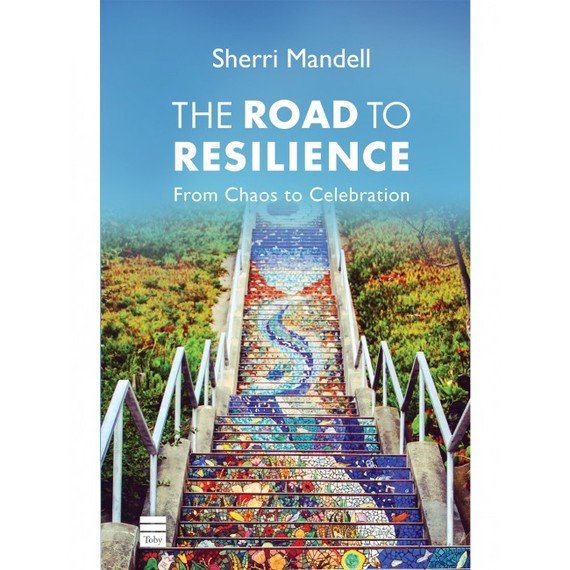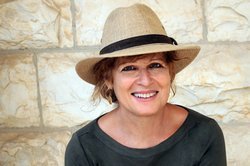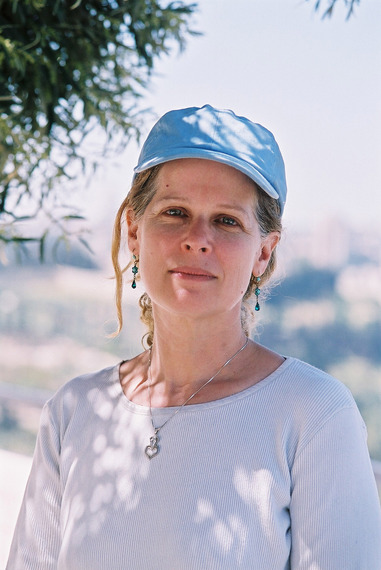Have you ever read a book so perfect that not a single word was superfluous or out of place? A book so packed with truth and wisdom you wanted to read each line to the other people in the room or call a friend to share what you'd read? That's how I felt about Sherri Mandell's book, The Road to Resilience. 
Sherri's 13 year-old son Koby and his friend Yosef Ish-Ran, were murdered by Arab terrorists in 2001, in an unspeakably brutal manner. Because I live in the same general area as the Mandell family, I was privy to the story and its details even before it was carried by the media. As a mother of many, I was shocked and horrified and yes, frightened that this could happen to my own children.
 The horror has never quite dissipated, though the horror of it is, of course, horror from a distance. The horror was and is not distant for Sherri and her family. I will see Sherri in the grocery store or at a conference, and the pain is there, etched into her skin and large expressive eyes. She is blond and beautiful and fragile. And I don't know how she puts one foot in front of the other to walk, how she manages to speak, or get out of bed each morning.
The horror has never quite dissipated, though the horror of it is, of course, horror from a distance. The horror was and is not distant for Sherri and her family. I will see Sherri in the grocery store or at a conference, and the pain is there, etched into her skin and large expressive eyes. She is blond and beautiful and fragile. And I don't know how she puts one foot in front of the other to walk, how she manages to speak, or get out of bed each morning.
The answer is, of course, the answer to Jewish survival. Like steel, we are strengthened by fire. Sherri is my emblem and my Jewish sister. I hug her in my mind's eye and I follow her every word.
I want to learn from her.
And that, in fact, is the message in her book that speaks loudest to me: trauma and hurt can turn us into teachers. Trauma, the thing we want least, the thing we pray will never happen to us, is the thing that makes us finer. Pain and grief can be catalysts for tremendous personal growth. It's something I knew, but Sherri has managed to put this into words both exquisite and profound. She takes you back to your place of pain and shows you how to use it for good.
The Road to Resilience describes what Sherri calls the seven C's: chaos, community, choice, creativity, commemoration, consecration, and celebration. This is a slim book, with one chapter devoted to each "C." Each chapter is followed by a short series of questions ("Can you see God in the midst of pain?") so you can use the book as a sort of workshop for grief.
Sherri shares wisdom from a wide font of sources, both Jewish and secular. She is equally comfortable quoting the Kotzker Rebbe, Christian theologian Henri Nouwen, or Michael Ondattje, and loves to play lexicographer, too. Mandell tells us about "contronyms" single words having two opposite meanings, like the two sides of a single coin, to teach us life lessons for personal growth.
But first we need to understand the meaning of "resilience." In her prologue, Sherri explains:
Jewish philosophy teaches that resilience is not overcoming, it's becoming. Becoming more, becoming our fullest, deepest selves as a result of adversity. We don't escape, but contemplate and reshape. We don't leap over troubles as if they don't exist. We allow them to be our teachers. We experience resilience when we are enlarged rather than diminished by our challenges, when facing adversity causes us to change, grow, and become greater.
Part of that becoming is to enter the chaos, the first leg of the journey and the first chapter of Mandell's book. Here, the author uses the metaphor of a vegetable seed to help explain why chaos is not a step we can or should avoid, in rebounding after tragedy.
Every seed has to disintegrate before it can turn into a vegetable. Every seed has to break apart to sprout; it has to surrender to the darkness of mystery in order to emerge. That process can feel excruciating. But it is only when the seed turns to nothing that it can, in fact, become something.
Even so, chaos, as the author points out, can be both healing and dangerous:
If a person remains in this unprotected territory of raw pain and need indefinitely, he or she won't be able to heal. On the other hand, if the person doesn't allow the trauma entrance, she or he may never recover.
I read these words, and recall exactly the feelings of rootlessness accompanying my grief in the days after my father's death when I was 13. My cousin the pediatrician left pills with my mother. There were pills to help me sleep at night, and pills to keep me calm and grounded during the shiva. But the pills only postponed grief by keeping the mourning process at bay, ensuring a lengthy stay in a weird state of limbo. The pills kept me from the chaos when I needed the chaos to move forward. I needed my shiva.
Shiva, of course, means being surrounded by community, and community is the next part of the journey to resilience, according to Mandell. Sherri describes a poignant memory to illustrate the importance of those who care for us and about us in our times of greatest sorrow:
On the first night after Koby was killed, when I went upstairs to my room, resting on my pillow was a little bunch of wildflowers from a friend with a card. Just when I thought I would die, I smiled. Because my friend had entered my room to give me love.

Author Sherri Mandell
In her chapter on choice, Mandell tells us that even in our darkest moments, when we're suffering from events beyond our control, there is probably still something we can choose, for instance, we can choose to accept help from others, and we can choose to see ourselves and others in a good light. Choosing, Sherri tells us, "will allow you to fare better in times of stress and trauma, when you feel that you have no control. But the more profound choice may be your ability to recognize God in your life--to believe that God is present in this pain. This enlargement, which may entail a revised understanding of the Divine, is a key component of resilience."
The Hebrew word for "faith," says Mandell, is emuna which is related to the word imun, training. "One has to work at faith," she tells us. "It's not a gift that is granted, but a muscle that needs to be constantly exercised and developed in an act of will."
Mandell doesn't neglect scientific research in her quest for truth and understanding and to further our own. It's there in her chapter on commemoration, where she points out research suggesting that those who know a great deal about their families fare better when dealing with difficulties. This interested me very much, as I have spent much time and effort researching my family tree. In fact, I began my genealogical work during a time of trauma and it did do a great deal to help me rebound and grow.
Science is also present in the chapter on commemoration, where the author describes that 61% of American aviators held captive in Vietnam, felt they had benefited from the experience. Here Mandell quotes the New York Times Magazine, "Perhaps it was no more than the desire to give meaning to a horrible time in their lives, but a follow-up study conducted twenty-five years later found that the soldiers remained convinced that the captivity had changed them for the better."
As a person who loves words, I appreciated the way Mandell weaves words and their meanings into her narrative. In her section on creativity, the author tells us, "In Hebrew the roots of the word for sadness (etzev) and design (itzuv) are the same. Sadness must be given shape."
Sherri also tells us that the Hebrew word for kindness, chessed, can also mean "disgrace," explaining that a small number of Hebrew words also mean their opposite, "a linguistic phenomenon known as a contronym." The author asks, "Can we allow ourselves to experience the healing power of kindness or do we feel ashamed at being its beneficiary?"
This book is a truly breathtaking piece of writing that cannot help but pierce the heart and give the reader a glimpse of the beauty inside tragedy, the hope inside of pain, and the growth that comes from the total disintegration of one's emotional shell. May the author know no more sorrow. And may she continue to be a beacon of light for her community and for her people.